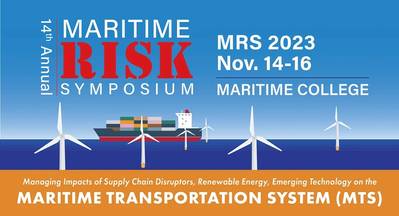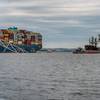14th Annual Maritime Risk Symposium to be Held Nov. 14-16 at SUNY Maritime
The 2023 Maritime Risk Symposium (MRS) will be held Nov. 14-16, 2023, as an in-person event, hosted by Maritime College, State University of New York (SUNY) at the Maritime Academic Center. The theme of the 14th annual event is “Managing Impacts of Supply Chain Disruptors, Renewable Energy, Emerging Technology on the Maritime Transportation System (MTS)” with a focus on offshore infrastructure risk and disruptors.
Founded in 1874, Maritime College is the oldest maritime college in the United States, providing mariner training for 150 years. This will be the second time for New York Maritime College to host the event, in collaboration with the U.S. Coast Guard, National Academy of Sciences, academic institutions, industry partners and federal, state and local agencies. SUNY Maritime last hosted in 2019.
This international event has previously focused on various elements of risk including choke points, maritime cyber security, and resilience. MRS 2023 will bring together academics, government, and commercial entities to discuss the emerging offshore energy industry and its threats, challenges and risks to the Maritime Transportation System. With a focus on the articulation of current and future marine transportation challenges and threats, the symposium will help frame issues that impact the implementation and operationalization of a sound marine transportation strategy. The symposium will assess threats and recent advancements in research to inspire ideas for innovative research that will help define offshore energy infrastructure safe working parameters to the maritime transportation system.
Why is this issue important?
The idea of assessing and quantifying massive offshore energy infrastructure and the various associated threat vectors is an issue that has come front and center since the horrific attack of 9/11. State and non-state actors understand the vulnerabilities within a global system that moves trillions of dollars of goods annually. Complicating this issue are growing threats to: the system’s cyber components, the dawn of autonomous shipping, electronic navigation, advances in fuel systems and the continued automation of the nation’s ports. MRS 2023 takes a more strategic and holistic view.
Superstorm Sandy paralyzed New York and it was the Marine Transportation System that answered the call, delivering needed supplies when shoreside transportation was shut down by the devastating storm and playing a major role in storm debris removal and infrastructure redevelopment. The MTS supports our nation’s needs in peace and in times of peril and relies on safe and sound policies regarding navigation safety; technology; support services; subsea and surface quality standards and assurances; offshore energy; cyber risk; port state control and infrastructure risk; and much more.
The issue of threats and risk to offshore energy systems has been well documented and a concern to navigational safety, the energy grid, cyber and national security. On Oct. 26, 2022, the Government Accountability Office released their report entitled “Offshore Oil and Gas: Strategy Urgently Needed to Address Cybersecurity Risks to Infrastructure.” This highlighted one significant threat vector – cybersecurity.
In the report the GAO noted, “Offshore oil and gas infrastructure faces significant and increasing cybersecurity risks in the form of threat actors, vulnerabilities and potential impacts.” The threat actors highlighted in the report: “State actors, cybercriminals and others could potentially conduct cyberattacks against offshore oil and gas infrastructure. The federal government has identified the oil and gas sector as a target of malicious state actors.”
The same report highlighted vulnerabilities, noting, “Modern exploration and production methods are increasingly reliant on remotely connected operational technology – often critical to safety – that is vulnerable to cyberattack. Older infrastructure is also vulnerable because its operational technology can have fewer cybersecurity protection measures.” The long-term impacts of a successful attack off shore was also highlighted in the same report, “A successful cyberattack on offshore oil and gas infrastructure could cause physical, environmental and economic harm, according to federal officials. For example, officials said that the effects of a cyberattack could resemble those that occurred in the 2010 Deepwater Horizon disaster. Disruptions to oil and gas production or transmission could also affect energy supplies and markets.”
In 2015 NATO conducted a workshop that also highlighted the risk to offshore energy platforms. The article NATO published on the event noted,
“A growing share of energy resources – both oil and liquefied natural gas – is produced offshore and transported by sea. This means that countries are increasingly dependent on the security of maritime energy infrastructure, which is vulnerable to a range of well-known risks and threats, including terrorist attacks, piracy and natural disasters. More recently, concerns about the potential consequences of cyberattacks have become more widespread.”
Recently discussions have gone from risk issues above the water, on wind farms and similar energy systems to the cable systems that transmit developed power. In a June 21, 2023, article for Euronews, reporter Denis Loctier highlighted how Belgian authorities were “stepping up efforts to ensure the safety of offshore infrastructure in the North Sea following a series of incidents that raised fears of attacks on underwater internet cables, gas pipelines and wind farms. Sightings of an undetected Russian ship in both Dutch and Belgian waters last November prompted intelligence officials to question if Moscow was spying on the North Sea's offshore wind farms.”
When interviewed for the Loctier article, Cmdr. Kurt De Winter, director of the Belgian Navy’s Maritime Operations Centre, said, “One of these threats is espionage and sabotage actions by the enemy to our vital infrastructure on the sea bottom. The threat is not only hypothetical, it’s a real danger.” Subsea transmission systems have been the focus of think tank work. The Center for European Policy Analysis, in a Jan. 23, 2023, article by Lukas Trakimavičius, warned that, “Energy installations at sea and subsea transmission infrastructure are at risk from a wide array of threats. These include anchoring, trawling or even terrorist attacks. However, there is also an even greater concern that hostile regimes could target this infrastructure to disrupt electricity flows.” The attack on the Nord Stream pipeline has underscored vulnerability and risk.
How will the Maritime Risk Symposium analyze these issues? The symposium will be broken down into seven panels:
- Calculating Offshore Energy Risks
- Maritime Autonomy: The Future is Technology
- Subsea and Surface infrastructure Quality Standards and Assurance
- Offshore Energy and Autonomy Cyber Risk
- Offshore Energy Port Infrastructure Risk
- Wind Farms: Who is in Charge?
- MRS Wrap-Up Panel – Symposium Highlights and Offshore Wind MTS Risk Management Interface and Research
Panel facilitators and panel members are world-class researchers, industry leaders and academics. Among the participants are Dr. Henry Willis of the RAND Corporation, a senior policy researcher and a professor in the Pardee RAND Graduate School; Dr. Kevin Jones, executive dean of the faculty of Science and Engineering University of Plymouth in the United Kingdom; and Capt. Zeita Merchant, commanding officer, U.S. Coast Guard Sector New York.
An evening reception on Nov. 14 will feature a student poster contest that will showcase some of the best and brightest students. Participating colleges include SUNY, U.S. Merchant Marine Academy, U.S. Coast Guard Academy, Stevens Institute, Webb Institute, Rutgers University, Old Dominion University and many others.
More information on the Maritime Risk Symposium 2023 can be found at: https://www.maritimerisksymposium.org/. For registration information, please contact Eric Johansson at [email protected]
About the Authors
Dr. Joe DiRenzo is a national co-chairman of the 2023 Maritime Risk Symposium and is the director of research partnerships at the U.S. Coast Guard Research and Development Center. A retired Coast Guard officer and former cutter commanding officer, he teaches for American Military University and National University.
Capt. Eric Johansson is a national co-chairman of the 2023 Maritime Risk Symposium and is a third-generation Port of New York and New Jersey tug captain. He has been at SUNY Maritime since 1994 and enjoys teaching and mentoring future professional mariners interested in towing, shipping, marine spatial planning, leadership and ship systems. He is founder of the annual SUNY Maritime College Towing Forum and author of several research projects.











